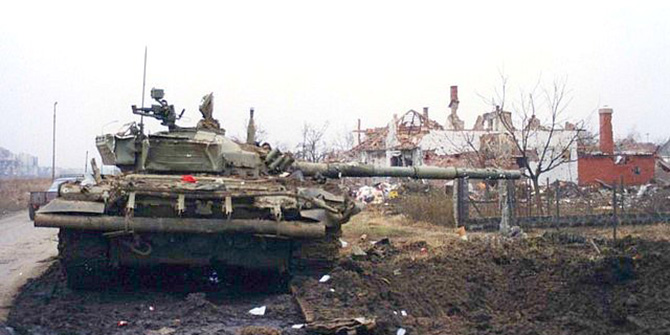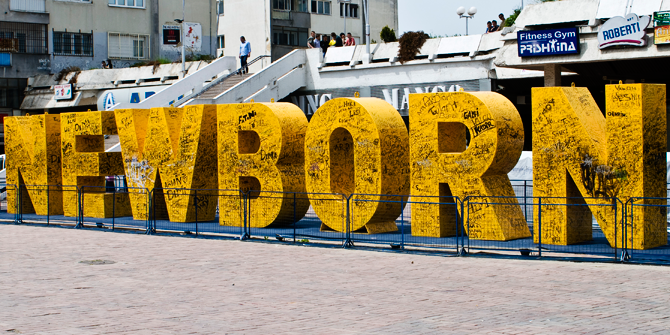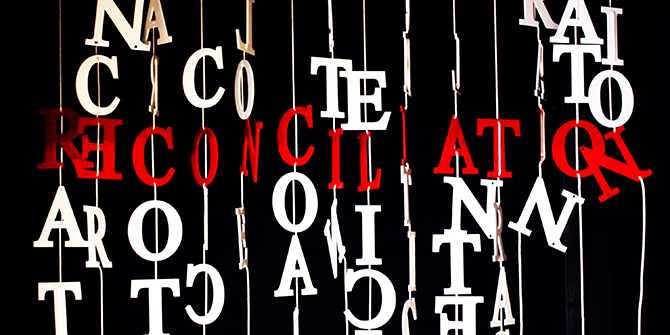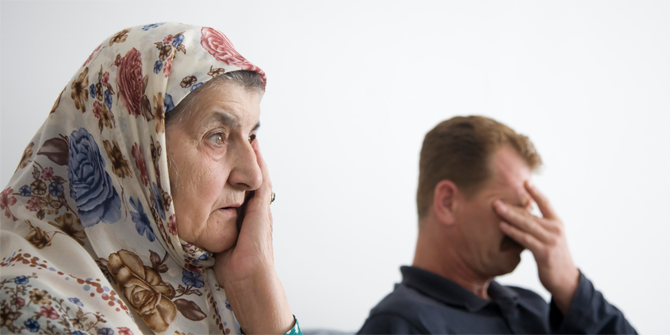
Dr Denisa Kostovicova tells us about her new interdisciplinary research project ‘Art and Reconciliation: Conflict, Culture and Community’, a collaboration with King’s College London and University of the Arts London that takes an innovative approach to reconciliation and conflict resolution.
Dr Denisa Kostovicova, Associate Professor of Global Politics in LSE Government, has been awarded funding for a ground-breaking collaborative research project, ‘Art and Reconciliation: Conflict, Culture and Community.’ The two year research project begins on 1 December 2016 and is funded through the Large Grant scheme of the Arts and Humanities Research Council (AHRC) under the Conflict Theme of the Partnership for Conflict, Crime and Security Research (PaCCS) and through the Global Challenges Research Fund (GCRF). We spoke to Dr Kostovivova to find out more about the project and what she hopes it will achieve.
What is the project about?
‘Art and Reconciliation: Conflict, Culture and Community’ is an interdisciplinary project that will investigate post-conflict reconciliation by combining history, political science, art and creative practice. From a historical perspective the investigation will focus on the concept and practice of reconciliation through time and in different geographical regions. We will interrogate both the use of art and related media in reconciliation initiatives and the potential of artistic practices and artefacts to play a role in inter-communal conflict resolution, remembrance, forgetting and forgiving. We will also conduct comparative empirical research, ‘mapping’ reconciliation activities across countries and over time and analysing discourses of reconciliation.
I am very excited about collaborating with Professor James Gow and Dr Rachel Kerr (Principal Investigator) of the Department of War Studies at King’s College London, and Dr Paul Lowe of the London College of Communication, University of the Arts London, who are leading experts in their respective fields. I’m also looking forward to engaging with our local NGO partners, the Post-Conflict Research Centre, Sarajevo, and the Humanitarian Law Centre, Belgrade, as well as commissioned artists. The project will be a wonderful opportunity to work together with senior advisors from the worlds of academia, policy-making, media, and the arts, to ensure the rigour, dissemination and impact of our research.
Why did you decide to combine political science, history and art?
The effects of war have a devastating impact on communities and inter-community relations. Even the pursuit of transitional justice, that aims to account for past mass atrocity, is often counter-productive. Instead of knitting communities together across sectarian lines, different transitional justice initiatives often have counter-intuitive effects and end up entrenching exclusive identities. These are reflected in ethno-centric discourses that close the opportunity for inter-ethnic communication and interaction. This is the reason why we need new ways of encouraging an inter-ethnic dialogue in post-conflict zones. Art has proven to be critical for challenging the dominant narratives and providing a space for inter-ethnic collaboration.
Similarly, we still lack a systematic analysis of dialogues about reconciliation historically, and contemporaneously. Deeper understanding of the possibilities and limits of post-conflict reconciliation can be achieved by applying novel research methods and techniques in arts and social sciences. Ultimately, our aim is to make a contribution to theorising post-conflict reconstruction, that will also help shape the practice and policy of peace-building.
What’s going to be your contribution to the project?
My contribution to this project builds on my recently completed research about a regional approach to transitional justice that was funded by the Leverhulme Trust. I will continue to study a unique civil society initiative in the Balkans that gathers members of all ethnic groups involved in the wars of former Yugoslavia’s disintegration. Known by its acronym RECOM, this initiative advocates the establishment of a regional fact-finding commission.
RECOM has conducted an extensive consultative process about transitional justice with key stakeholders such as victims, youth, war veterans, teachers, journalists, and lawyers. The duration and scope of these consultations is unprecedented in global terms. Recorded transcripts of these consultations in all languages spoken in the Balkans amount to about 4 million words of textual data. I will apply qualitative and quantitative text analytic techniques to discern patterns in the data and learn from them about the meaning and dynamics of reconciliation.
Who will benefit from your findings?
The idea for this project arose from a major gap identified by policy-makers working in the field of post-conflict reconstruction. Although billions of pounds internationally have been invested in post-conflict reconciliation projects involving aspects of justice and the creative arts, there has been no study of this phenomenon as such. To date, only isolated studies of particular places and projects have been undertaken. We still lack a codified body of knowledge pertaining to reconciliation.
Our research will benefit policy making, the civil sector and communities with its aim to better inform global policy-approaches to reconciliation and provide the knowledge needed to assess reconciliation projects and initiatives, based on the fine-grained empirical analysis of the Balkans. Last, but not the least, our students will benefit as well, since we plan to involve them in workshops, debates and exhibitions of the artefacts produced by the project.
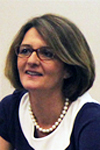 Dr Denisa Kostovicova is an Associate Professor of Global Politics in the LSE Department of Government.
Dr Denisa Kostovicova is an Associate Professor of Global Politics in the LSE Department of Government.
Follow Denisa on Twitter – @DenisaKost
‘Art and Reconciliation: Conflict, Culture and Community’ is an interdisciplinary, collaborative project between the LSE Department of Government, the KCL Department of War Studies and the London College of Communication, University of the Arts London.
Note: this article gives the views of the authors, and not the position of the LSE Department of Government, nor of the London School of Economics.


